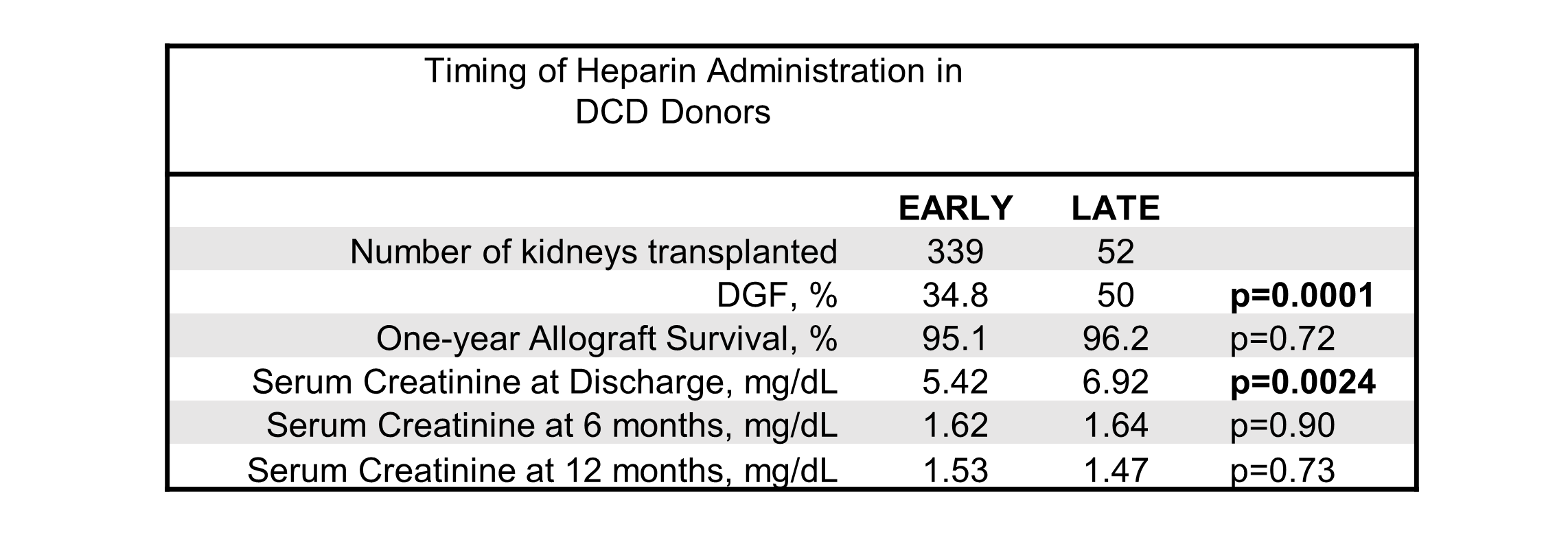Early vs. Late Heparin Administration After Declaration of Death in DCD Donors Does Not Impact Short Term Outcomes in Kidney Transplantation
Organ Recovery, LifeShare Transplant Donor Services of Oklahoma, Oklahoma City, OK
Meeting: 2022 American Transplant Congress
Abstract number: 905
Keywords: Donors, non-heart-beating, Kidney, Outcome, Preservation
Topic: Clinical Science » Organ Inclusive » 69 - Non-Organ Specific:Organ Preservation/Ischemia Reperfusion Injury
Session Information
Session Name: Non-Organ Specific: Organ Preservation/Ischemia Reperfusion Injury
Session Type: Poster Abstract
Date: Saturday, June 4, 2022
Session Time: 5:30pm-7:00pm
 Presentation Time: 5:30pm-7:00pm
Presentation Time: 5:30pm-7:00pm
Location: Hynes Halls C & D
Session Information
Session Time: 7:00pm-8:00pm
 Presentation Time: 7:00pm-8:00pm
Presentation Time: 7:00pm-8:00pm
Location: Hynes Hall C
*Purpose: Kidneys from Donation after Cardiac Death (DCD) donors are well-known to have satisfactory outcomes post-transplant. In DCD donors, heparin is typically given immediately prior to extubation. However, due to local administrative and cultural factors, some donor hospitals do not allow the administration of heparin prior to declaration of death. In these situations, the bolus dose of heparin (30,000 IU) is added to the first bag of in situ flush. Our study aims to investigate whether this practice impacts Delayed Graft Function (DGF), allograft survival, or early organ function of transplanted kidneys from DCD donors.
*Methods: We examined all local kidney donors from June 2018 to August 2021. Heparin administration practices at local donor hospitals were reviewed. Our internal donor database was cross-referenced with the UNOS Organ Utilization Tool from the same period. Recipients of deceased donor kidneys were stratified into two groups: DCD from donor hospitals which administered heparin prior to extubation (EARLY), and DCD at donor hospitals with delayed heparin administration (LATE). Statistical analysis was performed with MedCalc.
*Results: A total of 532 donors were recovered during the study period. Of them, 186 were EARLY and 30 were LATE DCD donors, resulting in 339 and 52 transplants. Recipients of EARLY and LATE DCD kidneys experienced a DGF rate of 34.8% and 50%, respectively (p = 0.0001). EARLY and LATE recipients demonstrated one-year allograft survival rates of 95.1 and 96.2%. (p=0.72). Discharge serum creatinine in EARLY and LATE kidneys was 5.42 (+/-3.24) and 6.92 (+/-3.66) mg/dl (p = 0.0024). Six-month serum creatinine in EARLY and LATE kidneys was 1.62 (+/-0.92) and 1.64 (+/-0.66 mg/dl (p=0.90). One-year serum creatinine in EARLY and LATE kidneys was 1.53 (+/-0.60) and 1.47 (+/-0.60 mg/dl (p=0.73).
*Conclusions: Observed DGF rates were higher in recipients of kidneys which were subject to late heparinization. Although we observed a higher creatinine on discharge in the delayed-heparin group, this was not observed at 6 and 12 months. One-year allograft survival was similar in both groups. We believe it is preferable to have consistent protocols throughout donor hospitals; however, local factors often prevent their implementation. The timing of heparinization of DCD donors – including heparinization after extubation – should not be an obstacle for accepting DCD kidneys.
To cite this abstract in AMA style:
Hawxby AM, Ketcham R, Squires R, Orlowski JP, Solomon H, Hostetler C. Early vs. Late Heparin Administration After Declaration of Death in DCD Donors Does Not Impact Short Term Outcomes in Kidney Transplantation [abstract]. Am J Transplant. 2022; 22 (suppl 3). https://atcmeetingabstracts.com/abstract/early-vs-late-heparin-administration-after-declaration-of-death-in-dcd-donors-does-not-impact-short-term-outcomes-in-kidney-transplantation/. Accessed February 15, 2026.« Back to 2022 American Transplant Congress

